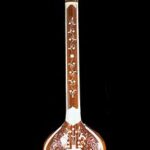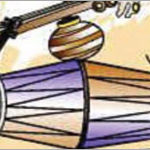Carnatic Music – Lyrics or Musical Experience?
In December, I took my annual pilgrimage to Chennai to attend the concerts and lecture-demonstrations that take place during the music season. In at least two of the lecture demonstrations, one question was repeatedly posed to the musician: “Why don’t you sing more compositions in the local language so that we can relate to the meaning of the songs? How can we appreciate the music if we cannot understand what you are singing?” In the context of a concert, few musicians are willing to answer such a question. But, it is none the less an important question. How can we understand and enjoy Carnatic music without understanding the lyrics and thus the meaning behind the compositions? Should not our Carnatic musicians sing predominantly in the local language where a concert is being held – e.g., in Tamil in Tamil Nadu or in Kannada in Karnataka?
Singing primarily in the local language is not a feasible option given that Carnatic music audiences, regardless of where they live, speak different languages. It is a fact of life in India that we speak various languages. Restricting Carnatic music concerts to a local language is nothing but language apartheid. I doubt that either audiences or performers would welcome such a proposition.
But the question remains, “Can we appreciate Carnatic music without understanding the language in which it is written?” Most Carnatic music compositions are written in one of five languages – Sanskrit, and the four Southern languages; Tamil, Kannada, Telugu, and Malayalam. The four Southern languages do have many words in common with each other as well as with Sanskrit. As such, with some effort, most rasikas should reasonably follow the lyrics. If a rasika seeks a greater understanding of the meaning and context of the lyrics, s/he will indeed have to do some extracurricular exploration in the form of reading up on the songs. This sounds unreasonable given that part of the fun of going to a concert is that it does not involve work.
It is also unreasonable to expect that every Carnatic music listener will research the lyrics before attending a concert, especially because they don’t know in advance what compositions are going to be rendered by an artist that day. Nevertheless, we can think of it this way – we do not refrain from reading the Bhagawad Geetha because Sri Krishna’s message is in Sanskrit. While some of us are merely content reading or reciting the Geetha, others research the Geetha further to understand the philosophy inherent in the sacred book. But again, research requires effort, and not all of us are that committed.
Still a limited understanding of the lyrics should not preclude a listener from enjoying the music. Carnatic music, like all music, is a language unto itself. The language in which a composition is written – Tamil, Malayalam, or Pashtu – need not limit our understanding. For example, Western operas are written in languages such as English, German, Italian, French, and Russian. Yet operas like Carmen and Madame Butterfly are enormously popular among audiences who are rarely proficient in French or Italian. This is because, like other music forms, Carnatic music is primarily a medium that communicates emotion and feeling; as such, it transcends the languages in which it is written. The feelings and emotions expressed by Carnatic music appeal to some but not to others. This makes listening to Carnatic music, similar to listening to other musical forms, a subjective experience – while some are pleased by the notes, others seek the structure of the rhythm and yet others, the lyrics and the meaning behind them. And, when we attempt to pigeon subjective hole phenomena such as these into one or more of its components, we will never succeed.
I am not suggesting that lyrics are unimportant. But, lyrics are not the sum total of musical experience. When we look at Michelangelo’s David or a Ravi Varma painting, even without knowing anything about art, we get a visceral sense of what the work of art means to us. I am not familiar with the Biblical story of David and Goliath, but when I saw Michelangelo’s 25-foot statue of David in Florence, I could not help but be moved. A true artist can convey pain, suffering, joy, and angst without saying a word. Music is no different – the arrangement of the notes, the rhythmic structure, the lyrics, the aesthetic expressions – all combine to give the listener a complete experience. As listeners, we should not judge music only by its independent units but by the collective experience of all of its attributes put together. To a listener, what matters is the totality of the experience rather than the functional use of a familiar language.
I am also not suggesting that the messages communicated in a composition are irrelevant. For example, the morals expressed in Thyagaraja Swami’s or Shyama Sastri’s compositions are very important. However, it is not necessary that a listener understands every context and message. Such understanding enhances the experience but is not a pre-requisite for taking part in the experience. In this sense, music is similar to religious worship. As Hindus, we recite mantras and slokas in Sanskrit, a language few of us understand. But the mental peace many of us get from praying is independent of a defined meaning – it transcends definition and is beautiful for that reason.
Recently I spoke to a group of kids growing up in the U.S. and tried to explain the nuances of Carnatic music and the emotions that are expressed through specific ragas and compositions. As part of this talk, I played a composition of Shyama Sastri s “Devi brave samayAmidE” in Chintamani raga. In this song Syama Sastri pleads with the Goddess Parvathi to help her compete with a great musical scholar, Kesavayya. When the song was finished, I asked an eight-year-old girl sitting in the front row how she felt after listening to this composition. She said that listening to this song made her feel sad and that the singer (implying the composer) was upset about something and looking for help. But, she could not figure out what it was. This young kid, growing up in a foreign country and who probably has a limited understanding of her own mother tongue, was able to feel the emotions that Shyama Sastri was expressing. That is the power of great music. It can transcend the barriers of time, age, and language to move you to your core.
In the words of the Taoist philosopher Chuang Tzu, “Fishing baskets are employed to catch fish; but when the fish are caught, the men forget the baskets. Words are employed to convey ideas, but when the ideas are grasped, men forget the words.”
By Dr. Ram S. Sriram
Please do not reprint without permission. Write to vidyarthifoundation@gmail.com
The article was originally published in Chennaionline magazine.




Leave a Reply
You must be logged in to post a comment.